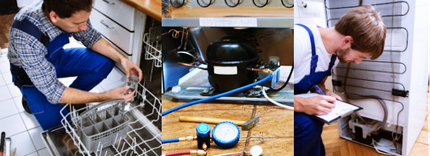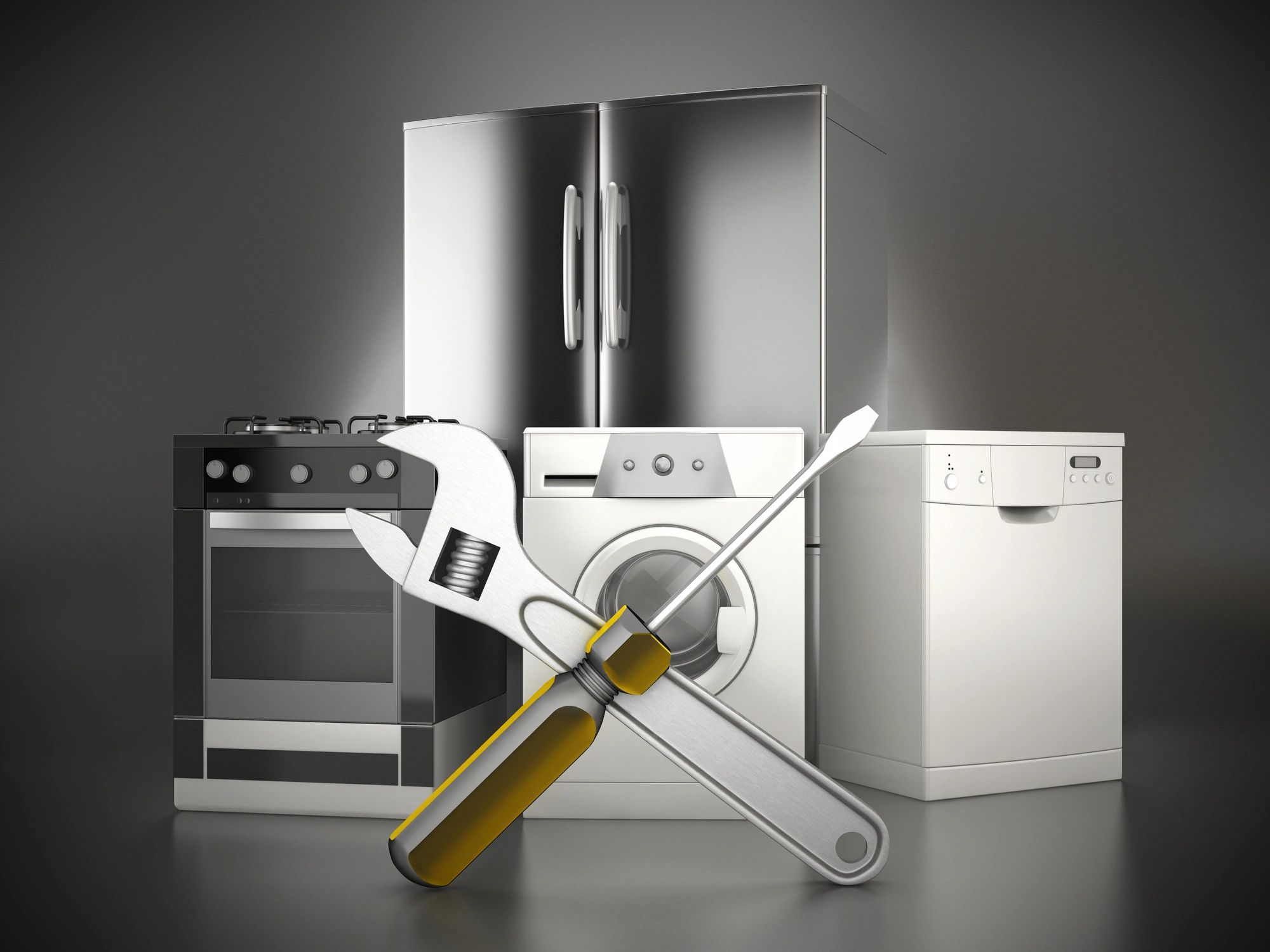Pros, Cons & Best Practices – Dependable Refrigeration & Appliance Repair Service Washing Machine Repair
Pros, Cons & Best Practices – Dependable Refrigeration & Appliance Repair Service Washing Machine Repair
Blog Article
A Comprehensive Look at DIY Home Appliance Repair for Homeowners
If you have actually ever before faced a defective device, you know exactly how discouraging it can be. Recognizing common concerns and using the ideal troubleshooting strategies can save you money and time. With the right devices and a little know-how, you could take on small repairs on your own. However when do you understand it's time to call a specialist? Let's discover the essentials of do it yourself appliance repair work and what you require to maintain your home running efficiently.
Comprehending Usual Appliance Problems
When your devices begin acting up, it can feel overwhelming, specifically if you're uncertain what the trouble is. Common concerns commonly arise with refrigerators, washers, and clothes dryers, and recognizing what to try to find can save you time and anxiety. If your refrigerator isn't cooling, inspect the temperature setups or pay attention for unusual noises that might suggest a falling short compressor.With washing machines, leaks typically stem from worn pipes or damaged door seals. If your clothes dryer isn't home heating, a stopped up vent may be the perpetrator.
Essential Devices for DIY Repair Works
Having the right devices can make all the difference in your DIY device repair efforts. Begin with a reliable toolset that consists of screwdrivers-- both flathead and Phillips-- because many home appliances utilize these sorts of screws. A strong set of pliers is important for clutching, twisting, or cutting cables. You'll additionally desire a socket established for removing bolts and nuts that hold devices together.A multimeter is crucial for inspecting electrical connections and detecting problems. Don't forget a level to ensure your devices rest appropriately, as this can influence performance. Think about spending in a torque wrench for particular tightening demands. A great flashlight or job light will certainly assist you see right into tight or dark areas. With these devices in hand, you'll be fully equipped to tackle most DIY device fixings with self-confidence.
Fixing Techniques for Home Appliances
Before diving into repair work, it is crucial to identify the problem impacting your device. Beginning by observing any type of unusual noises, leaks, or error codes. Take note of when the problem takes place-- does it happen throughout certain cycles or under certain conditions? This can use clues.Next, get in touch with the user manual for repairing ideas. Several devices consist of a fixing section that may resolve your problem straight. Online sources, discussion forums, and video clips can likewise give beneficial insights.If you can, perform simple tests: for a washing device, check if the door lock is involving appropriately; for a fridge, see if it's maintaining the ideal temperature.Lastly, do not forget to inspect source of power-- ensure your home appliance is connected in which breaker are working. By methodically tightening down the problem, you'll be better outfitted to tackle the repair work effectively.
Step-by-Step Repair Work Guides for Major Equipments
While you could really feel daunted by the idea of fixing significant devices, following a clear step-by-step guide can make the process workable. Start by determining the problem-- this can be anything from a refrigerator not cooling to a washing equipment not rotating. Once you've pinpointed the issue, gather the needed devices like screwdrivers, pliers, and a multimeter.Next, consult your appliance's manual for specific instructions and diagrams. This resource can be very useful for comprehending exactly how to take apart and reconstruct your home appliance safely. Begin the repair service by unplugging the unit and eliminating any kind of panels or covers. Meticulously examine components, replacing any defective parts as needed.After you've finished the fixing, rebuild the home appliance and test it to verify everything jobs effectively. Ultimately, maintain a record of your repair work for future reference. With technique, you'll gain confidence in tackling much more complicated concerns.
Safety Tips for Appliance Repair Work
Before you start any kind of home appliance repair work, see to it you're equipped with the ideal personal protective tools like gloves and safety and security goggles. Constantly unplug the device or switch off the source of power to prevent any kind of mishaps. Remaining risk-free is equally as essential as finishing the repair service itself.
Personal Safety Equipment
When dealing with appliance repair service, it is important to prioritize your safety and security by wearing the appropriate personal safety equipment (PPE) Beginning with safety goggles to protect your eyes from debris and prospective sprinkles. Next, use handwear covers to safeguard your hands from sharp sides and dangerous materials. Relying on the appliance, you may additionally need a dirt mask to stay clear of inhaling dirt or fumes. Tough footwear is crucial, as well; select closed-toe footwear to stop injuries from hefty things. Think about making use of knee pads if you'll be functioning on the flooring for extensive durations. By equipping yourself with proper PPE, you'll reduce threats and concentrate on the task available, making certain a more secure and extra reliable fixing procedure.

Source Of Power Measures
Guaranteeing that a home appliance is detached from its power resource is necessary for your safety and security throughout repair work (Kenmore Dryer Repair Oro Valley Dependable Refrigeration & Appliance Repair Service). Before you begin, disconnect the device or switch off the circuit breaker. This straightforward step stops electrical shocks or crashes. Always ascertain that the power is off utilizing a voltage tester-- don't depend on presumptions! If you're dealing with bigger appliances, consider using a lockout/tagout system to stop unintended resurgence. Keep your workplace completely dry and clear of clutter to minimize risks. Put on shielded gloves and use devices with rubber holds to provide additional protection. Finally, never ever attempt repair work in damp conditions, as water and power don't blend. By adhering to these precautions, you'll develop a safer atmosphere for your DIY repair task
When to Call a Professional

Safety Concerns First
Although dealing with DIY appliance repair work can be gratifying, it's vital to recognize your limits and focus on safety. If you run into any indications of electric concerns, like sparks or unusual smells, stop promptly and call a professional. Do not attempt fixings involving gas lines or complex wiring unless you're extensively educated. Always unplug appliances prior to working with them, and use protective equipment to secure on your own from possible risks. If you're unsure about a fixing or really feel overloaded, seeking expert aid is the best option. Your security is more crucial than saving a few dollars. Bear in mind, some repairs can bring about significant injury or further damage to your home appliance otherwise handled correctly. Trust your impulses-- when in doubt, connect for professional support.
Complex Repair Issues
When devices malfunction past fundamental issues, it's typically best to contact a specialist. If your you can try this out fridge isn't cooling down, your cleaning device will not spin, or your stove will not heat up, these problems can signify a lot more complex problems. Attempting to repair these by yourself can result in additional damages or safety and security hazards. You might experience electrical issues, weird noises, or dripping liquids that call for specialized knowledge and devices. If you're unsure about the repair service process or do not have the necessary competence, don't hesitate to connect for professional assistance. It can save you time, money, and the irritation of trial-and-error fixes. Relying on a qualified specialist assurances your devices are brought back securely and efficiently, allowing you to return to your day-to-day routine.
Service warranty Considerations
Before attempting any repair work, it is essential to inspect if your home appliance is still under service warranty. If it is, you might wish to stay clear of DIY repairs altogether. Making adjustments or opening up the home appliance can void the guarantee, leaving you in charge of future repair services. Instead, reach out to the producer or authorized service facility for specialist assistance. They typically have actually trained specialists who can diagnose and deal with problems quickly. If your device runs out service warranty and you feel positive in your abilities, you can wage DIY repair services. If you're unclear pop over to these guys or face complicated issues, calling an expert is generally the safer selection. Bear in mind, purchasing professional assistance can conserve you time and protect against more damages.
Maintaining Your Appliances for Long life
To assure your home appliances serve you well for several years to come, regular maintenance is key. Beginning by cleaning your home appliances frequently; dust and particles can accumulate and prevent performance. For fridges, inspect the door seals and clean the coils to keep them efficient. Laundry your cleaning device's drum and dispensers to stop mold and odors.Don' t forget to inspect pipes and links for leakages or use. For dish washers, run a cleansing cycle regular monthly to confirm correct water drainage and remove odors.Keep an eye on any unusual sounds or efficiency problems-- addressing these early can protect against expensive repair work down the line (Dependable Refrigeration & Appliance Repair Service Washing Machine Repair). Refer to your home appliance guidebooks for specific maintenance suggestions and advised service intervals. By taking on these practices, you'll not just prolong the life of your home appliances but also improve their efficiency, conserving you money and time over time
Frequently Asked Inquiries
What Home appliances Are A Lot Of Generally Fixed by Property Owners?
When it pertains to do it yourself repair work, house owners commonly take on washing machines, dryers, refrigerators, and dish washers. You'll discover these home appliances are most generally taken care of since they frequently encounter issues and can be manageable with fundamental tools.
How Can I Find Device Fixing Parts Easily?
You can locate device repair work components quickly by searching online sellers, visiting local equipment stores, or checking manufacturer web sites. Don't forget to have your device design number convenient to assure you get the ideal parts.
Exist Online Resources for Do It Yourself Home Appliance Repair Work Videos?
Yes, there are a lot of online resources for DIY device repair work videos. YouTube is a wonderful beginning, in addition to web sites like RepairClinic and AppliancePartsPros, which supply step-by-step guides to wikipedia reference assist you fix and fix your home appliances.
What Typical Mistakes Should I Prevent During Services?
During repairs, stay clear of hurrying your job, missing safety and security precautions, or overlooking to check out guidebooks. Don't assume you recognize everything; ask for aid if required. Always keep your work area arranged to avoid losing devices or components.
Exactly How Can I Tell if a Component Is Well Worth Fixing?
To figure out if a component's worth fixing, evaluate its cost compared to substitute. Check accessibility, ease of fixing, and whether the device's overall value warrants the initiative. If fixings cost much more, take into consideration replacing it rather.
Report this page